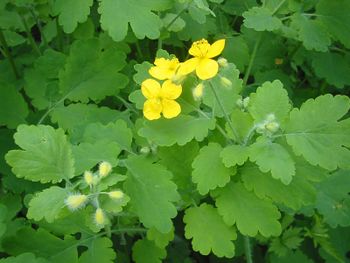Greater Celandine
See also :
- Chelidonium majus (Homeopathy)
- Ukrain
Other Names: Bai Qu Cai, Celandine, Celandine Herb, Celandine Root, Celidonia Mayor, Chelidonii, Chelidonii Herba, Chelidonium majus, Grande Chélidoine, Grande Éclaire, Greater Celandine Above Ground Parts, Greater Celandine Rhizome, Greater Celandine Root, Herbe à Verrues, Herbe aux Verrues, Parties Aériennes de la Grande Chélidoine, Racine de Chélidoine, Racine de Grande Chélidoine, Rhizome de Chélidoine, Rhizome de la Grande Chélidoine, Schollkraut, Tetterwort, Verruguera.
Greater celandine is a plant long used in herbal medicine and in traditional Chinese medicine. Available in supplement form, greater celandine is often said to fight cancer. Although research suggests that greater celandine may offer certain health benefits, there's also some evidence that it might be toxic to the liver.
Special Precautions of Greater Celandine
- There's some concern that greater celandine may harm liver health. In a report published in the Journal of Ethnopharmacology in 2009, for instance, scientists warn that several cases of acute hepatitis have been linked to greater celandine consumption in previously published studies.Given the potential for liver damage, it's critical to consult your physician prior to using greater celandine (especially if you have a history of liver problems).
- Greater celandine may trigger a number of side effects, including nausea, dizziness, fatigue, and fever.
- When applied to the skin, greater celandine can cause allergic skin rash.
- Blockage of the bile duct (bile duct obstruction): Some greater celandine extracts appear to increase the flow of bile. There is a concern that this might make bile duct obstruction worse.
- Liver disease, including hepatitis: There is some evidence that greater celandine can cause hepatitis. Don’t use greater celandine if you have liver disease.
- Medications that can harm the liver (Hepatotoxic drugs) interacts with GREATER CELANDINE
The benefits of Greater Celandine are
Greater celandine is touted as a natural remedy for a number of health conditions, including:
- angina
- asthma
- atherosclerosis
- constipation
- Upset stomach (dyspepsia), when a combination of greater celandine and several other herbs is used. The combination (Iberogast, Medical Futures, Inc) includes greater celandine plus peppermint leaf, German chamomile, caraway, licorice, clown's mustard plant, lemon balm, angelica, and milk thistle. Research suggests that taking 1 mL of this combination three times daily over a period of 4 weeks significantly reduces severity of acid reflux, stomach pain, cramping, nausea and vomiting.
- as a hepatic and bitter principle to stimulate the liver and gallbladder, improve digestion and appetite, and gastric or colic spasms.
- coughs
- eczema
- gout
- high blood pressure
- irritable bowel syndrome
- menstrual problems
- osteoarthritis
- toothache
- In addition, greater celandine is said to relieve pain, promote detox, stimulate the immune system, and fight cancer.
- Corns and warts (External) : The juice/extract of Chelidonium majus is used for treating a variety of skin problems. This includes chronic, malignant disorders and corns apart from warts.
- It is also used for the treatment of skin suffering from a herpes infection.
- Eczema : Preliminary research indicates that greater celandine may help treat atopic dermatitis (a form of eczema). In a 2011 study published in the Journal of Ethnopharmacology, for instance, researchers tested the effects of greater celandine on a group of mice with atopic dermatitis. Results revealed that greater celandine significantly reduced the severity of several eczema symptoms, including itching and inflammation. However, it's unknown whether greater celandine might have the same effect on eczema in humans.
- Cataract : Chelidonium majus has appreciable tissue rejuvenating properties, and this is why it is also used in the treatment of cataract and blind spots on the cornea of eye.
- The juice of Chelidonium majus has anti-bacterial/anti-fungal effect and thus, it is used as a remedy for stopping excessive bleeding.
- Cancer : A greater celandine extract shows potential as an anti-cancer drug, according to a research review published in BMC Cancer in 2005. For the review, investigators analyzed seven clinical trials on the use of a proprietary greater celandine extract (called Ukrain) in treatment of cancer. Although the review's authors found that the extract had beneficial effects on several types of cancer, they caution that most of the trials were of poor quality and state that "independent rigorous studies are urgently needed" before greater celandine can be recommended in treatment of cancer.In laboratory tests on human cancer cells, scientists have found that greater celandine may fight cancer by inducing apoptosis (a type of programmed cell death involved in stopping the spread of cancer cells).
